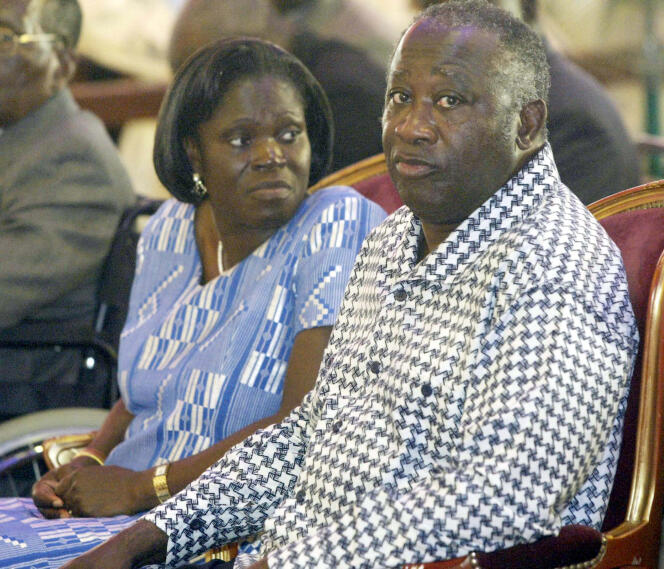
A historic pairing in Ivorian politics has officially come to an end. Some 50 years of companionship, militancy, imprisonment, and exercise of power. Laurent Gbagbo and Simone Ehivet Gbagbo were married in 1989 and officially divorced 34 years later, on June 29. Ehivet's lawyer, Ange Rodrigue Dadjé, said the divorce was "to the exclusive detriment of Mr. Gbagbo for characterized and notorious adultery, abandonment of the marital home, and serious insults to Ms. Simone." It will be up to the former president, "who was so keen to divorce," to drop "his appeal against the divorce decision so that his wish can finally become a reality." In Côte d'Ivoire, the Gbagbo divorce is more than a just family matter.
When he returned to Abidjan in June 2021 after a 10-year absence, Gbagbo, freshly acquitted of crimes against humanity by the International Criminal Court (ICC), made the formalization of the divorce proceedings his first public act. Airport footage of Ehivet pushed back like a stranger surprised his supporters and comrades. Everyone knew that the romance had long dissipated, and the husband had rebuilt his life with a former journalist, Nady Bamba, but the exposure of the break-up was brutal. This divorce, far from a tabloid anecdote, is as intimate as it is political.
Political partnership
For a long time, the Gbagbos were a formidable pair, as admired as they were feared. Brilliantly literate and politicized from an early age, Ehivet was a teacher who became involved in trade unionism in the 1970s. Her fight for a multi-party system led to her being imprisoned many times in President Félix Houphouët-Boigny's Côte d'Ivoire. Her political destiny accelerated when she met Gbagbo in 1973. Four years her senior, he was already a seasoned Marxist militant and had just been released from a military internment camp.
The two lovers took part in underground revolutionary cells. Then, in 1982, they founded the emblematic party of the Ivorian left, the Front Populaire Ivoirien (FPI). She was its driving energy, mobilizing the party's grassroots. The pair had two daughters – twins – whom Ehivet raised alone when Gbagbo went into exile in France.
The couple married just after returning to Abidjan in January 1989. "A 15,000-franc wedding" with half a dozen guests, Gbagbo told his close friends. The Gbagbos lived together in Cocody Riviera, a district of Abidjan, campaigned together, and were even incarcerated together. "They were a very close couple," a long-time friend of the couple said. "But she was not just a Madame Gbagbo, a glamorous, public relations-oriented First Lady. She was a pillar of Ivorian politics, solid and popular, with a powerful personality and convictions." Under her influence, the Catholic Gbagbo embraced evangelicalism, of which his wife had become fervent. She was vice president of Parliament from 1995 to 2000 and MP from 1996 to 2004.
But behind the scenes, from the 1990s onwards, long before the Gbagbos came to power, the couple was no more than a facade for a political partnership. Gbagbo has been in a relationship with journalist Nadiana "Nady" Bamba since 1997, with whom he married in 2001 according to Malinke and customary Muslim rites. They had a son the following year.
'Iron lady'
Simone Gbagbo said nothing publicly. Her priorities were elsewhere. From 2000 to 2011, "in Côte d'Ivoire, there was not just one reigning leader, but two," wrote the magazine Jeune Afrique in 2012. The duo complemented each other: He was the humorist, the conciliator, while she was the one to take a hard, uncompromising line, openly hostile to France, the opposition, and the rebels. She was nicknamed "the Iron Lady." Sometimes worse. Her assistant, Anselme Seka Yapo, was sentenced to life imprisonment in 2016 for the 2002 assassination of former president Robert Guéï and his family. The French justice system also suspected her of having played a role in the disappearance of French-Canadian journalist Guy-André Kieffer in 2004.
After refusing to concede defeat to Alassane Ouattara in 2010, the couple was arrested in the bunker of the presidential residence after twelve days of fighting in Abidjan in April 2011. Sentenced in 2015 to 20 years' imprisonment for "undermining state security," Simone Gbagbo benefited from an amnesty law in 2018 in the name of "national reconciliation." She awaited the return of her husband, acquitted after being tried for crimes against humanity before the ICC. However, he and Nady Bamba moved to Belgium upon his release in 2019. The Gbagbo family also took different political paths. They had to abandon the FPI label at the hands of Pascal Affi N'Guessan to found their own parties: the Parti des peuples africains- Côte d'Ivoire (PPA-CI) for him, the Mouvement des générations capables for her.
What is the point of such a belated divorce? Gbagbo has not elaborated on his motives since a chilling statement in 2021, in which he denounced "Dame Simone Ehivet's repeated refusal to agree to an amicable separation, which would be an appropriate way of resolving their mutual personal and political statuses." Some observers see this as the wish of Bamba, who follows Gbagbo like a shadow, or the desire to dissociate his name from that of Simone Ehivet Gbagbo. Only the quest for power would appear to be able to bind them together again.